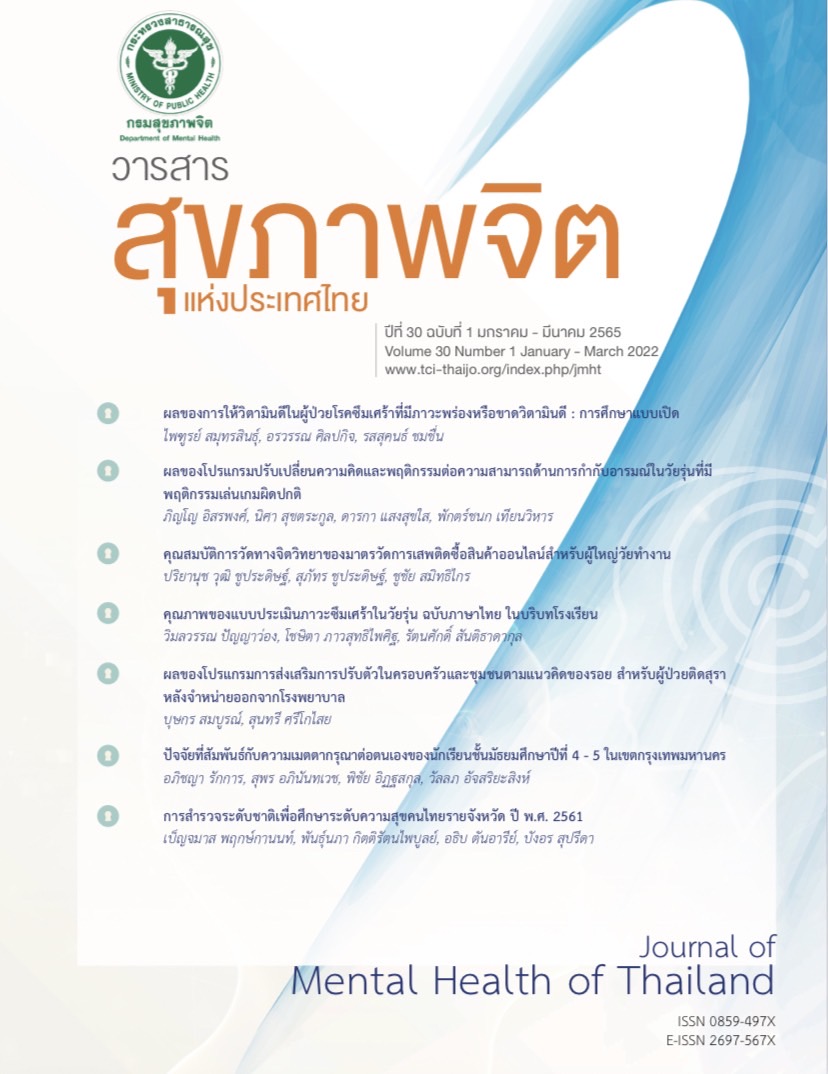ผลของโปรแกรมปรับเปลี่ยนความคิดและพฤติกรรมต่อความสามารถด้านการกำกับอารมณ์ในวัยรุ่นที่มีพฤติกรรมเล่นเกมผิดปกติ
คำสำคัญ:
การกำกับอารมณ์, การปรับเปลี่ยนความคิดและพฤติกรรม, โรคติดเกม, วัยรุ่นบทคัดย่อ
วัตถุประสงค์ : 1) เพื่อพัฒนาโปรแกรมปรับเปลี่ยนความคิดและพฤติกรรมต่อความสามารถในการกำกับอารมณ์ในวัยรุ่นที่มีพฤติกรรมเล่นเกมผิดปกติ 2) เพื่อเปรียบเทียบคะแนนการกำกับอารมณ์ระหว่างกลุ่มที่เข้าร่วมโปรแกรมฯ กับกลุ่มที่ได้รับการพยาบาลตามปกติ
วิธีการ : เป็นการวิจัยและพัฒนา ประกอบด้วย 2 ขั้นตอนหลัก ได้แก่ 1) การพัฒนาโปรแกรม มี 4 ขั้นตอน คือ การกำหนดปัญหา การสำรวจความต้องการ การออกแบบโปรแกรม และการตรวจสอบความตรง และ 2) ทดสอบผลของโปรแกรมกลุ่มตัวอย่าง คือ วัยรุ่นอายุ 15 - 18 ปีที่มีพฤติกรรมเล่นเกมผิดปกติที่เข้ารับการรักษาที่สถาบันสุขภาพจิตเด็กและวัยรุ่นราชนครินทร์ โดยแบ่งเป็น 2 กลุ่ม ได้แก่ กลุ่มที่ได้รับโปรแกรมฯ จำนวน 28 คน และกลุ่มที่ได้รับการพยาบาลตามปกติจำนวน 28 คน ประเมินผลด้วยแบบประเมินการกำกับอารมณ์ทั้งก่อนเข้าร่วมโปรแกรม หลังสิ้นสุดโปรแกรมทันที ติดตามผล 1 เดือน และ 3 เดือน วิเคราะห์ข้อมูลด้วยสถิติ independent t-test และความแปรปรวนสองทางแบบวัดซ้ำ
ผล : โปรแกรมปรับเปลี่ยนความคิดและพฤติกรรมที่พัฒนาขึ้นเป็นการบำบัดแบบรายบุคคลโดยเข้าร่วมทั้งหมด 8 ครั้ง ภายใน 4 สัปดาห์ ใช้เวลาครั้งละ 30 - 90 นาที พบว่า คะแนนการกำกับอารมณ์ของกลุ่มทดลองมากกว่ากลุ่มควบคุม เมื่อสิ้นสุดโปรแกรมฯ ทันที รวมถึงติดตามผล 1 เดือน และ 3 เดือน อย่างมีนัยสำคัญทางสถิติที่ระดับ .01
สรุป : โปรแกรมปรับเปลี่ยนความคิดและพฤติกรรมต่อความสามารถในการกำกับอารมณ์ในวัยรุ่นที่มีพฤติกรรมเล่นเกมผิดปกติเป็นทางเลือกหนึ่งในการบำบัดวัยรุ่นที่มีพฤติกรรมติดเกมที่มีปัญหาการกำกับอารมณ์ร่วมด้วยได้อย่างมีประสิทธิภาพ
Downloads
เอกสารอ้างอิง
World Health Organization. Inclusion of “gaming disorder” in ICD-11 [Internet]. Geneva: World Health Organization; 2018 [cited 2020 Sep 18]. Available from https://www.who.int/news/item/14-09-2018-inclusion-of-gaming-disorder-in-icd-11
Mihara S, Higuchi S. Cross-sectional and longitudinal epidemiological studies of Internet gaming disorder: a systematic review of the literature. Psychiatry Clin Neurosci. 2017;71(7):425-44. doi:10.1111/pcn.12532.
ชาญวิทย์ พรนภดล, บัณฑิต ศรไพศาล, กุสุมาวดี คำเกลี้ยง, เสาวนีย์ พัฒนอมร. การพัฒนาแบบทดสอบการติดเกม [The development of game addiction screening test (GAST)]. วารสารสมาคมจิตแพทย์แห่งประเทศไทย. 2557;59(1):3-14.
วรุณา กลกิจโกวินท์, ชัยพร วิศิษฎ์พงศ์อารีย์, พิสาส์น เตชะเกษม, ชาญวิทย์ พรนภดล, บุษบา ศุภวัฒน์ธนบดี. การติดเกมส์คอมพิวเตอร์ ปัจจัยเสี่ยงและปัจจัยป้องกันของเด็กนักเรียนในเขตดุสิต กรุงเทพมหานคร [Computer game addiction: risk and protective factors in students in Dusit district, Bangkok]. วชิรเวชสาร. 2558;59(3):1-13.
ขวัญจิต เพ็งแป้น. การป้องกันปัญหาภาวะสุขภาพของเด็กติดเกมออนไลน์ [Preventing health problems of childhood addicted to online games]. วารสารราชธานีนวัตกรรมทางวิทยาศาสตร์สุขภาพ. 2560;1(1):16-30.
สุภาวดี เจริญวานิช. พฤติกรรมการติดเกม: ผลกระทบและการป้องกัน [Game addiction behaviors: impacts and preventions]. วารสารวิทยาศาสตร์และเทคโนโลยี. 2557;22(6 ฉบับพิศษ):871-79.
Fauth-Bühler M, Mann K. Neurobiological correlates of internet gaming disorder: similarities to pathological gambling. Addict Behav. 2017;64:349-56. doi:10.1016/j.addbeh.2015.11.004.
Dong G, Potenza MN. A cognitive-behavioral model of Internet gaming disorder: theoretical underpinnings and clinical implications. J Psychiatr Res. 2014;58:7-11. doi:10.1016/j.jpsychires.2014.07.005.
Carroll KM, Kiluk BD, Nich C, Babuscio TA, Brewer JA, Potenza MN, et al. Cognitive function and treatment response in a randomized clinical trial of computer-based training in cognitive-behavioral therapy. Subst Use Misuse. 2011;46(1):23-34. doi:10.3109/10826084.2011.521069.
Newman CF. Cognitive-behavioral therapy for alcohol and other substance use disorders: the beck model in action. J Cogn Ther. 2019;12:307-26. doi:10.1007/s41811-019-00051-9.
Beck AT, Wright FD, Newman CF, Liese BS. Cognitive therapy of substance abuse. New York: Guilford press; 1993.
ดาราวรรณ ต๊ะปินตา. การให้การปรึกษาโดยการปรับความคิดและพฤติกรรม [Cognitive behavior counseling]. วารสารพยาบาลสาร. 2558;42(ฉบับพิศษ):205-13.
Castagna PJ, Upton SR, Long AC. Cognitive behavior therapy for children with emotion regulation challenges. In Maykel C, Bray MA, editors. Promoting mind–body health in schools: interventions for mental health professionals. Washington: American Psychological Association; 2020. p. 317-33.
Stevens MWR, King DL, Dorstyn D, Delfabbro PH. Cognitive–behavioral therapy for Internet gaming disorder: a systematic review and meta-analysis. Clin Psychol Psychother. 2019;26(2):191-203. doi:10.1002/cpp.2341.
Torres-Rodríguez A, Griffiths MD, Carbonell X. The treatment of Internet gaming disorder: a brief overview of the PIPATIC program. Int J Ment Health Addict. 2018;16(4):1000-15. doi:10.1007/s11469-017-9825-0.
Pornnoppadol C, Ratta-apha W, Chanpen S, Wattananond S, Dumrongrungruang N, Thongchoi K, et al. A comparative study of psychosocial interventions for internet gaming disorder among adolescents aged 13-17 years. Int J Ment Health Addict. 2020;18:932-48. doi:10.1007/s11469-018-9995-4.
Gross JJ, John OP. Individual differences in two emotion regulation processes: implications for affect, relationships, and well-being. J Pers Soc Psychol. 2003;85(2):348-62. doi:10.1037/0022-3514.85.2.348.
van Meijel VB, Gamel C, van Swieten-Duijfjes B, Grypdonck MH. The development of evidence‐based nursing interventions: methodological considerations. J Adv Nurs. 2004;48(1):84-92. doi:10.1111/j.1365-2648.2004.03171.x.
จารุวรรณ ลิ้มไพบูลย์, ปาหนัน พิชยภิญโญ, สุรินธร กลัมพากร. ผลของโปรแกรมลดพฤติกรรมก้าวร้าวในวัยรุ่นตอนต้น [Effect of prevention program on aggressive behavior of early adolescents]. วารสารสุขภาพจิตแห่งประเทศไทย. 2554;19(1):160-170.
ณัฏฐลิณ คุ้มรอด. ผลของโปรแกรมการกำกับอารมณ์ต่ออาการซึมเศร้าในผู้ป่วยโรคซึมเศร้า [The effect of the emotion regulation program on depressive symptoms of patients with depressive disorder] [วิทยานิพนธ์ปริญญามหาบัณฑิต]. กรุงเทพฯ: คณะพยาบาลศาสตร์ จุฬาลงกรณ์มหาวิทยาลัย; 2558.
Hollon SD, Kendall PC. Cognitive self-statements in depression: development of an automatic thoughts questionnaire. Cogn Ther Res. 1980;4(4):383-95. doi:10.1007/BF01178214.
ลัดดา แสนสีหา. ความซึมเศร้าและความคิดอัตโนมัติในทางลบของวัยรุ่นตอนปลาย [Depression and negative automatic thoughts of late adolescents] [วิทยานิพนธ์ปริญญามหาบัณฑิต]. เชียงใหม่: บัณฑิตวิทยาลัย มหาวิทยาลัยเชียงใหม่; 2536.
ศิริไชย หงษ์สงวนศรี, พนม เกตุมาน. Game addiction: the crisis and solution [อินเทอร์เน็ต]. กรุงเทพฯ: คณะแพทยศาสตร์โรงพยาบาลรามาธิบดี มหาวิทยาลัยมหิดล; 2549 [สืบค้นเมื่อวันที่ 4 ก.ย. 2563]. จาก: https://med.mahidol.ac.th/ramamental/psychiatristknowledge/childpsychiatrist/06112015-1432
Mauss IB, Bunge SA, Gross JJ. Automatic emotion regulation. Soc Personal Psychol Compass. 2007;1(1):146-67. doi:10.1111/j.1751-9004.2007.00005.x.
พรพิมล พรมนัส. ผลของโปรแกรมการกำกับอารมณ์ต่อความสามารถทางอารมณ์และสังคมของเด็กที่มาจากครอบครัวหย่าร้าง [The effects of an emotion regulation program on the social and emotional competency of children from divorced families] [วิทยานิพนธ์ปริญญามหาบัณฑิต]. กรุงเทพฯ: คณะพยาบาลศาสตร์ มหาวิทยาลัยธรรมศาสตร์; 2561.
Zakaria S, Sasagawa S, Essau CA. Exploring the impact of a transdiagnostic cognitive behavioural therapy-based intervention on a group of Malaysian adolescents with problematic drug use and emotional problems. Addict Behav Rep. 2021;14:100381. doi:10.1016/j.abrep.2021.100381.
Henggeler SW, Sheidow AJ. Empirically supported family-based treatments for conduct disorder and delinquency in adolescents. J Marital Fam Ther. 2012;38(1):30-58. doi:10.1111/j.1752-0606.2011.00244.x.
ดาวน์โหลด
เผยแพร่แล้ว
รูปแบบการอ้างอิง
ฉบับ
ประเภทบทความ
สัญญาอนุญาต
ลิขสิทธิ์ (c) 2022 วารสารสุขภาพจิตแห่งประเทศไทย

อนุญาตภายใต้เงื่อนไข Creative Commons Attribution-NonCommercial-NoDerivatives 4.0 International License.
- ผู้อ่านสามารถนำข้อความ ข้อมูล จากวารสารไปใช้ไปใช้ประโยชน์ทางวิชาการได้ เช่น เพื่อการสอน เพื่อการอ้างอิง แต่การนำไปใช้เพื่อวัตถุประสงค์อื่น เช่น เพื่อการค้า จะต้องได้รับอนุญาตเป็นลายลักษณ์อักษรจากกรมสุขภาพจิตก่อน
- ความคิดเห็น ข้อมูล และบทสรุปต่าง ๆ ที่ลงตีพิมพ์ในวารสารสุขภาพจิตแห่งประเทศไทยเป็นของผู้เขียนบทความและมิได้แสดงว่ากองบรรณาธิการหรือกรมสุขภาพจิตเห็นพ้องด้วย




